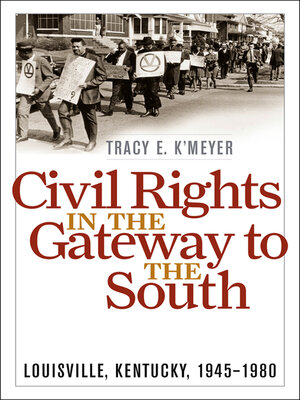Civil Rights in the Gateway to the South
ebook ∣ Louisville, Kentucky, 1945–1980 · Civil Rights and the Struggle for Black Equality in the Twentieth Century
By Tracy E. K'Meyer

Sign up to save your library
With an OverDrive account, you can save your favorite libraries for at-a-glance information about availability. Find out more about OverDrive accounts.
Find this title in Libby, the library reading app by OverDrive.



Search for a digital library with this title
Title found at these libraries:
| Loading... |
A noted civil rights historian examines Louisville as a cultural border city where the black freedom struggle combined northern and southern tactics.
Situated on the banks of the Ohio River, Louisville, Kentucky, represents a cultural and geographical intersection of North and South. This border identity has shaped the city's race relations throughout its history. Louisville's black citizens did not face entrenched restrictions against voting and civic engagement, yet the city still bore the marks of Jim Crow segregation in public accommodations.
In response to Louisville's unique blend of racial problems, activists employed northern models of voter mobilization and lobbying, as well as methods of civil disobedience usually seen in the South. They also crossed traditional barriers between the movements for racial and economic justice to unite in common action.
In Civil Rights in the Gateway to the South, Tracy E. K'Meyer provides a groundbreaking analysis of Louisville's uniquely hybrid approach to the civil rights movement. Defining a border as a space where historical patterns and social concerns overlap, K'Meyer argues that broad coalitions of Louisvillians waged long-term, interconnected battles for social justice.
"The definitive book on the city's civil rights history." —Louisville Courier-Journal
Situated on the banks of the Ohio River, Louisville, Kentucky, represents a cultural and geographical intersection of North and South. This border identity has shaped the city's race relations throughout its history. Louisville's black citizens did not face entrenched restrictions against voting and civic engagement, yet the city still bore the marks of Jim Crow segregation in public accommodations.
In response to Louisville's unique blend of racial problems, activists employed northern models of voter mobilization and lobbying, as well as methods of civil disobedience usually seen in the South. They also crossed traditional barriers between the movements for racial and economic justice to unite in common action.
In Civil Rights in the Gateway to the South, Tracy E. K'Meyer provides a groundbreaking analysis of Louisville's uniquely hybrid approach to the civil rights movement. Defining a border as a space where historical patterns and social concerns overlap, K'Meyer argues that broad coalitions of Louisvillians waged long-term, interconnected battles for social justice.
"The definitive book on the city's civil rights history." —Louisville Courier-Journal






